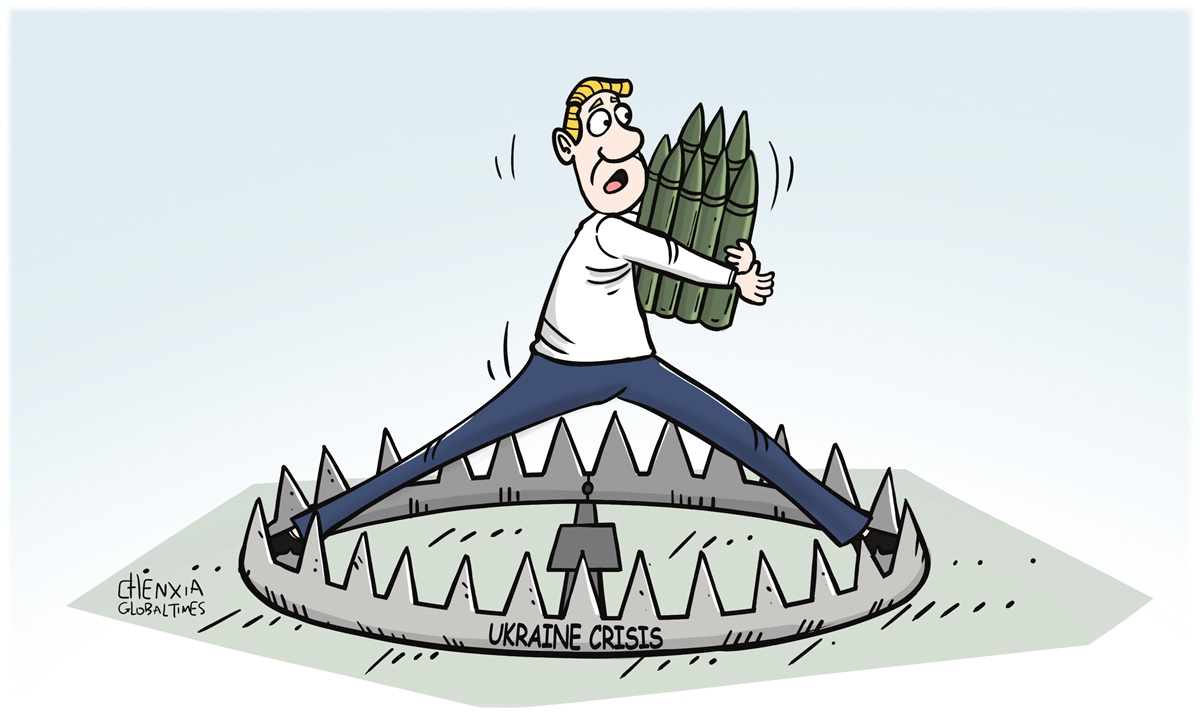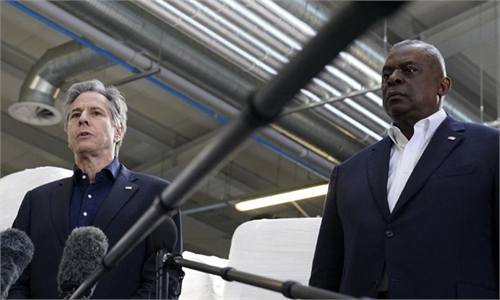
Ukraine crisis Illustration: Chen Xia/GT
They call them war games, but games are the very last thing they are. And to play war games when there is a real war going on is a very dangerous game to play indeed.
There are different schools of thought about multinational joint military exercises. One is that they test the capability of resources and strategy, the integrity of co-operation between countries, and by demonstrating effectiveness to potential adversaries, it is argued, they contribute to stability around the world. Another view is that far from being a deterrent, they can be seen by that same potential adversary as a risky escalation - not least because they are increasingly used to "field test" new systems - and therefore can cause instability. In short, the question is do war games increase the risk of conflict rather than counter it?
And how much riskier is it if those games are played out in an area where there is already a real war raging, like Europe?
This is important to consider because Britain has just announced it will play a significant role in a major series of military exercises during the course of May which will see tens of thousands of troops from a dozen or more countries - one of the largest deployment of Western troops since the Cold War - engaged in what the UK's Defense Secretary Ben Wallace described as a "show of solidarity and strength," involving NATO and its allies and partners in theatres from Finland on the Baltic to North Macedonia on the Aegean.
This month, Britain is sending 8,000 troops, 72 tanks and 120 armored fighting vehicles to eastern Europe even as the war in Ukraine continues to rage. It is part of Exercise Arrow, involving troops also from the US, Latvia, Finland and Estonia. Also this month, the UK military will take part in Exercise Hedgehog on the Estonia-Latvia border with 18,000 NATO troops, helicopters, armored forces, artillery, electronic warfare, air defense and surveillance drones. At the same time, Exercise Defender will take place in Poland with military personnel from a dozen nations. And then Exercise Swift Response in North Macedonia will involve simulated airborne assaults of troops from the US, the UK, France, Italy and Albania.
This is massive military activity in Europe during May - and that's not even counting the very real war being fought in Ukraine. Some might think the last thing a cauldron of conflict needs to have is more fighting on its doorstep.
But surely there is more to this than the very reasonable need for nations to test and prove their defensive abilities to other nations. Wallace's own comments betray the fact that these current operations in Europe are not merely intended to test the defensive capacity of the most powerful military alliance on the planet - bolstered by those who are not even formal members of the alliance - but are in fact a way to send a crude political signal to those it sees as that adversary: namely, Russia.
A press release from the UK's Ministry of Defence announcing participation in the exercises quotes the British Army's Commander Field Army Lieutenant General Ralph Wooddisse: "The UK makes a significant contribution to the defence of Europe and the deterrence of Russian aggression. The British Army's series of exercises is fundamental to both. We continue to deploy across Europe, from the Baltic to the Aegean." That last line seems to deliberately echo Churchill's famous speech of 1946, which talked of an Iron Curtain descending across Europe from "Stettin in the Baltic to Trieste in the Adriatic," and is generally seen as marking the start of the Cold War. Perhaps this marks the start of a new Cold War.
During that Cold War, there was a NATO military exercise in 1983 which almost resulted in the ultimate horror, a nuclear conflagration between the superpowers. It was caused by misunderstanding at a time of heightened international tension - much like the risk today.
Able Archer was an annual NATO operation which came at a time when US president Ronald Regan had branded the USSR as an "evil empire." Soviet pilots had shot down a Korean airliner which had flown into closed airspace around sensitive military and naval bases, and cruise missiles capable of striking targets within five minutes were being deployed at Greenham Common in southern England. The realism of Able Archer convinced the Soviets that the exercise was just a mask for an actual attack and they placed their nuclear forces on alert.
In tone, language and in reality, the rhetoric around this month's exercises takes us back almost four decades when sabre rattling and political posturing brought the planet to the brink of disaster. Today, are the Western powers caught in an escalation trap which will only exacerbate the conflict in Ukraine and do nothing to end hostilities and bring a negotiated peace? Even worse, does it risk creating a real a war game which could end the world?
The author is a journalist and lecturer living in Britain. opinion@globaltimes.com.cn

